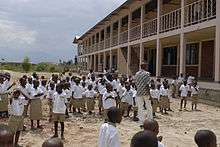Education in Burundi

Education is compulsory in Burundi for six years, between the ages of 7 and 13.[1] Theoretically, primary education is free at point of use.[2]
Primary education in Burundi spans six grades between the ages of 7 and 13. The next educational tier, known as Lower Secondary, comprises an additional four grades. Upper Secondary includes three further grades.[2] Students sit exams in their penultimate year of primary school known as the Sixth Year Certificate (Certificat de la Sixième) as well as examinations in their 10th year to determine their eligeability for Upper Secondary. Finally, a final examination is set in the final year of Upper Secondary known as the Diploma for the End of Secondary Study (Diplôme de Fin d Études Secondaires).[2]
In 2015, the gross primary enrolment rate for children (aged 5–14) was 61 percent.[3] 26 percent of children in the same age group combined education with paid work.[3] There was a 66 percent completion rate for primary education.[3] The student–teacher ratio in Burundi in 2011 was 29.4:1.[2]
General levels of education in Burundi are low. In 2011, the country had an estimated literacy rate of approximately 60 percent.[1] The Burundian government is a signatory to various international protocols against child labour.[3]
In practice, the reality of the Burundian education system is often different from its legal structure. The fighting during the Burundian Civil War (1993–2006) did particular damage to the education system. Around 25 percent of all the country's schools were destroyed and many teachers were killed or became internally displaced.[1] Over 6,000 Burundian children also live in refugee camps outside Burundi.[3]
References
External links
| Wikimedia Commons has media related to Education in Burundi. |
- Burundi (Education) at Nations Encyclopedia